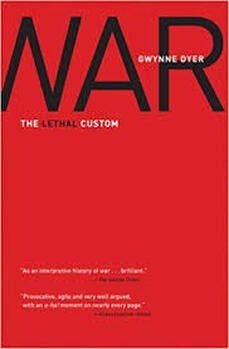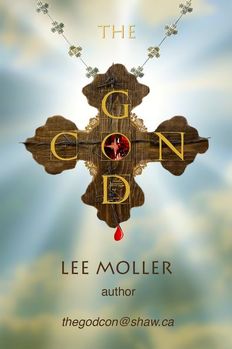 Dyer is a Canadian war researcher who wrote this book in 1985. From what I can gather, it is well respected. This edition has been revised and updated. The book tours war historically, examining its roots and its evolution over the millennia. The opening comments discuss some of the big picture history. For example, major battles prior to the 20th century would generate casualty rates as high as 50-60%, with an average of 20. In modern battles, this figure rarely exceeds 1 percent. This was due largely to changes in technology (weapons got better). This in turn changed the nature of soldiers and their mission. In the old days, soldiers did not get combat fatigue (shell shock, or today: PTSD) because they would die before it ever happened. Today, all armies recognize that troops can only take so many combat days (in WWII, it was 240) before they fall apart. Dyer has always impressed me especially with regard to basic training, which he discusses in a chapter called "Any one's Son Will Do". Get them when they are young. Break them down to the same level, making them all equals, and then build up a small group dynamic where each man relies on the others to help him stay alive. Drill Sergeants are masters of psychological manipulation, and they know it. In his opening chapter, Dyer makes this startling revelation: In WWII in the ETO, only 15% of combat infantry riflemen ever fired their weapon in anger! Most soldiers would never have reveal such a fact, until they were told they were not at all alone. More than four fifths of combat soldiers got through the war with killing anyone, and without firing a shot! More research has backed this up. Gettysburg was a hugely costly battle for Americans because it was Americans on both sides. More than half of the recovered muskets from the battle were loaded with more than one round, and only 5% were ready to be fired when they were abandoned or dropped. Six thousand had as many as 10 rounds in the barrel. In other words, most of the fighters were spending their time reloading a loaded gun, and, one assumes, ducking. No one is suggesting these men were cowards. Many were simply principled and did not want to kill. The upshot of this is startling: if you could get the malingerers to enter the fray, the other guys didn't stand a chance. Which they did. New training got the numbers up to 50% in Korea and 80% in Vietnam. The US had figured out how to get men to kill automatically. Dehumanizing the enemy was a big part of it. War goes back a long way. Chimps war on each other and so do we. We did not invent war, we inherited it. Dyer examines hunter gatherer groups and their interaction; ritualized warfare in groups like New Guinea bushmen; and other evidence of our more primitive past. Some suggest that ritualized warfare is not the "real deal". It does generate casualties at a low rate, which meant that they could do it a lot, which in turn meant high casualty rates over time. Hobbs, Rousseau and Darwin are invoked and examined for their viewpoints. The birth of war was driven by human life style choices. Hunting and gathering can keep you alive. So can farming. But a new type of living was now being made: pastoralism (i.e.: nomads). They lived by herding domesticated animals. Inevitably, these groups clashed. The nomads would win fights because they were mobile, which meant they could concentrate their forces when needed. To combat this, walls around towns were built. When horses were domesticated, things accelerated. It is worth noting that Egypt was largely spared from nomadic attacks by its geography. The Sumerians hit upon the idea that religion could be a better way of settling disputes. It worked for a while. Priests liked it because it gave them power. But as we know, religion is not a cure for war, but more often an excuse or a direct cause. Aside: Women were equal partners in life until civilization and agriculture came along, driving the need for a power structure which eschewed women because it could. Sargon was the worlds first emperor over a militarized society (circa 2300 BC). Around then, there was a major technological innovation: the compound bow. The bow and arrow has killed more people than any other weapon, ever. Unlike the English longbow (yet to be invented), the composite bow was short, powerful and could be fired from horseback. Other inventions over time include the chariot (fast, hit and run, archery platform); the pike and phalanx; war galleys; improved, harder metals; bigger horses; the saddle and stirrup (700 AD); gun powder (1300 AD); and organized armies (which gave the powers-that-be the willies). Aside: Japan had a warrior based culture. When the musket was introduced, they were appalled. A samurai could be killed by a commoner! Unacceptable… so they just stopped making them. That obviously changed later in history. Armies got bigger, the percentage of soldiers dying went up, battles were huge but infrequent; and the average citizen was left alone. Armies had to be trained and fed. You could not just conscript someone and throw them into battle. Standing armies were a part of every major European power from 1700 on. What happened next was the introduction over time of the concept of "total war". New weapons were being developed at a quick pace. It was soon discovered that a few men behind cover with guns could stop a large number of advancing troops. Tactics changed. WWI introduced the concept of the continuous front. The tank was used for the first time. It gave professional soldiers the hope that it might end the wars of attrition. It did, but it caused the continuous front to become mobile. This and aircraft took a terrible toll on civilians. The tank eventually spawned "blitzkrieg", or mobile "lightning" war. The world wars were the first where civilian deaths outnumber the deaths of combatants. The next chapter in the book documents the history of nukes. There have been a lot of ideas over the years on this subject, but the prevailing idea is that you only need enough to destroy the other guy. This was known as MAD (Mutually Assured Destruction). And so far, this math has kept the nuclear peace for 75 years. The advent of nukes gave rise to the phrase "conventional war". The birth of the professional army came in 1803 Prussia with the creation of the Kriegsakademie. This approach of using well trained professional soldiers was soon adopted by others. One hundred Germans in WWII were a match for 125 British or 250 Russian troops. Why? Because they had 10x as many good generals who knew how to get the most from men and equipment. The old game is now protected turf and generals everywhere want to keep it that way (the start of the military-industrial complex?). Technology has changed the equation a great deal. One example: a Spitfire in WWII cost 5,000 pounds to make. The supersonic Tornado, its 3rd generation successor, cost 17 million, 172 times more after adjusting for inflation. The last chapter speculates about the future of war: Baboons are nasty creatures. The males are obsessed with status and fight all the time. But in one troop something unusual happened. The aggressive males all died off at once from eating infected meat. Overnight, the troop settled down to a much more egalitarian society. And it stayed that way even after the demographics of the tribe returned to normal! The ritualized war fare on New Guinea bushmen killed a large percentage of combatants, one at a time, year after year. The government stepped in and told them this had to stop. They all agreed enthusiastically and never looked back! It seems both were caught in a local stability point that they could not get out of without a nudge. Perhaps there is hope in both those stories. While not as eye-opening a book as Guns Germs and Steal, this book is a must read for anyone who wishes to grapple with these thorny issues. War has been with us for all of our history. But perhaps we can first ritualize it, and then dump it as a bad idea. I doubt it. The New Guinea bushmen were offered an alternative to their wars… essentially third party arbitration. This is something the top dogs will never agree to. One final tidbit: Have you ever wondered if you were safer as an officer in combat, or as a soldier? In WWII, the answer was "soldier". In Vietnam, it did not matter. Dyer himself has served, so he has seen some of all this from the inside.
0 Comments
Leave a Reply. |
AuthorLee Moller is a life-long skeptic and atheist and the author of The God Con. Archives
May 2024
Categories
All
|

 RSS Feed
RSS Feed